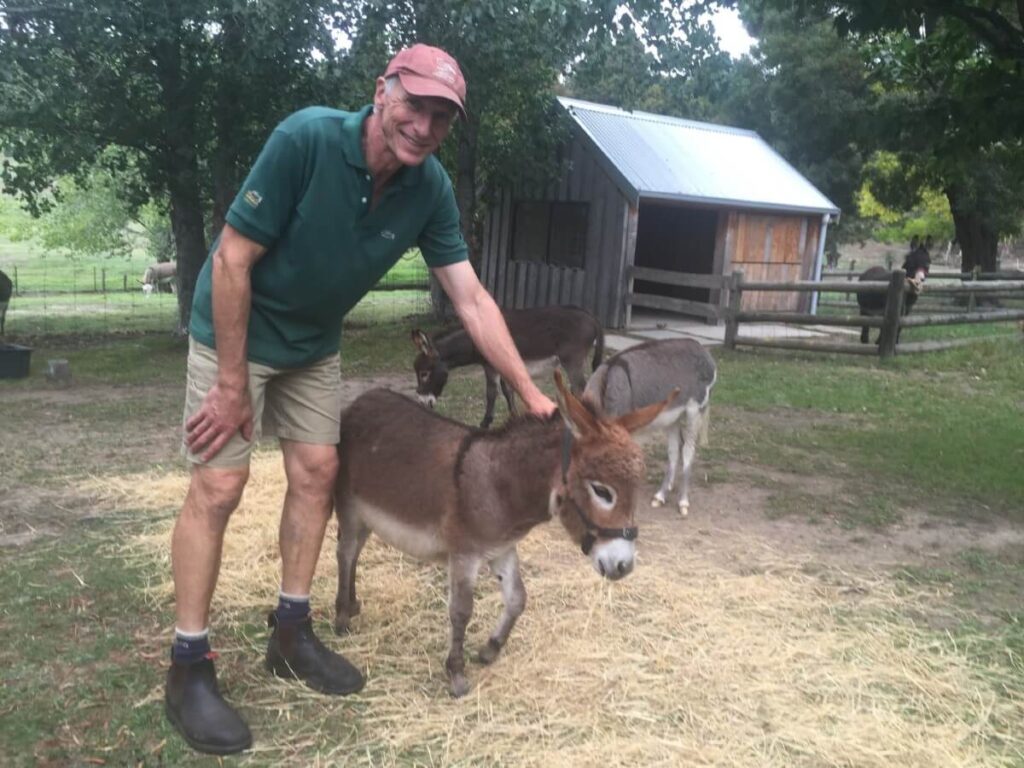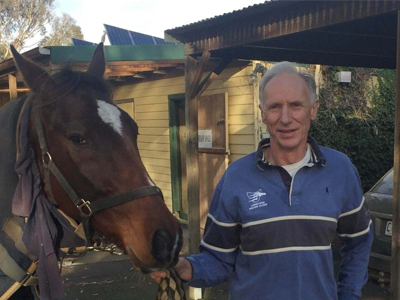We’re heading interstate and off the mainland this month to meet our featured vet, Chris Cornes of Longford Equine Clinic in Tasmania. But that trip’s nothing compared to the traveling Chris has done in his life.
Here’s what he has to tell us about his travels, his practice and his thoughts on being a vet today.
How Did You Become A Vet?
Growing up on a farm, I loved being outdoors and I liked animals, so I guess studying to be a vet was a natural progression. My family moved to Western Australia about the time I reached university age, and Murdoch University had just started offering a veterinary science degree, so I enrolled there. I was part of the second cohort of vets to graduate from Murdoch – just 34 of us! Things are very different today.
After graduation I worked in a practice in WA, dealing primarily with cattle, which was only to be expected given my farm background. I found I was testing thousands of cattle for pregnancy in the days before ultrasound, when it really was a hands-on (hands-in?) process! For some reason it didn’t take long before I was bored, so I quit and headed off to the UK in search of adventure.
I worked as a locum across England and Scotland. It was pretty different work, being mostly pets rather than cow after cow all day. My time at Dingwall in Scotland stands out – the people were so welcoming. They offered me a permanent position and I was tempted, but in the end I decided I couldn’t handle the climate.
By the time I came back to Australia in 1987, I’d had enough of mixed practice. I wanted to specialise in one species rather than knowing a little bit about everything. I settled on horses (no more cows, thanks very much!) and have been working in equine practices ever since. I’ve been in Tasmania for nearly 30 years now. It can get chilly here, but it’s still warmer than Scotland!
Tell Us About Your Practice
Longford Equine’s a specialist equine practice, very close to Longford Racecourse. We attend meetings there to keep an eye on all the racehorses.
Caring for mares during stud season is obviously very important to our business, but we also do a lot of athletic work. We attend the thoroughbred trials at Longford, and the races at Launceston. We also go to the standardbred races at Carrick and Launceston.
We don’t just work with racehorses either! We have all kinds of equines as patients. That includes miniature donkeys – one of our clients breeds them and they’re cute and charming little animals.

I joined the practice in 1999. We used to have 4 vets but have dropped to two. Finding staff is a challenge. We’ve been advertising for two years without success. At this stage of my life, I’d ideally like to work 2-3 days a week, but with only two of us that’s not possible. Being on call every other night is a bit much too. As we told the ABC recently, if we can’t find at least one more vet we’ll probably have to close the Clinic. It’s ironic given Australia’s training so many more vets now than it used to, but it seems to be a problem everywhere.
What About Your Connection With Radincon?
Longford Equine Clinic got our first digital X-ray equipment from Radincon nearly 15 years ago. It’s an Eklin device; we still have it; it still works. It’s given us far less trouble than the wireless one we bought from someone else more recently. So Jon (Marriott) is right when he says quality’s worth the extra price over the long term.
We catch up regularly with the Radincon team – they supply our gloves, aprons and so on. It’s always good to have a chat.
What Are Your Plans For The Future?
Unless we find a vet to join us soon, we’ll be closing the practice. I’ve been thinking about what I might do next and I’d like to work part-time in some way related to local wildlife. That could be part of a scientific study, or possibly assisting with conservation. It’s something to explore.
And Finally: What Advice Do You Have For Anyone Starting Out As A Vet Nowadays?
Now that’s a big question! As I already said, things are so different now!
First up, it’s hard to get vets these days, so you’re in a position of power. If you find you’re unhappy somewhere, don’t stick around suffering in silence. Sort it out or move on. You’ll find another role.
On the other hand, you have to accept that some parts of the job will be rough and to look after yourself. That includes mental toughness. It’s hard when you can’t save someone’s beloved pet and they blame you. Or when you’re on call in the evenings and can’t go out with your friends.
So make sure you leave your work at work when you do have time off. And try to schedule some regular activity which helps you get away from the practice and from being a vet. For example, I play tennis on Friday afternoons – not every Friday, but almost every Friday. We have to be really under the pump for me to give that up. It’s how I keep going. I also do a lot of Bikram yoga (hot yoga) which is really helpful physically and mentally.
Oh, one final thing. Make sure your clients pay you! Most will, but don’t let the tricksy ones get away with it.
***
Thank you Chris Cornes of Longford Equine for taking time out to talk to us.
We have a special interest in your practice, since you look after Fizz, a beautiful little Arab who paired up with Radincon sponsored rider Susan Woodward for her first 160km endurance ride in 2022. Any vets out there interested in caring for horses great and small, get in touch with Longford Equine now!
If we can’t magic a vet into existence to keep the practice going, at least we know you’ll still be working with animals, helping out the local wildlife.

